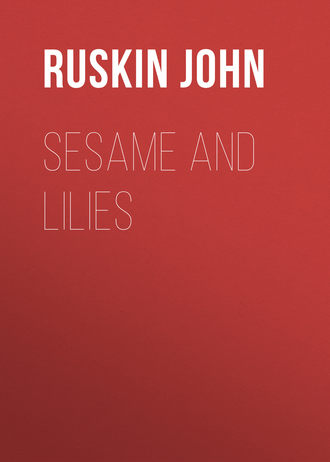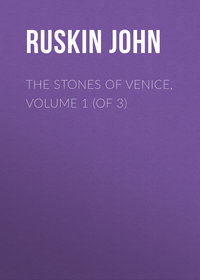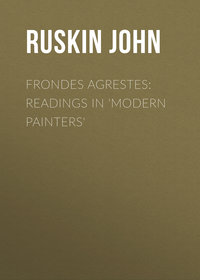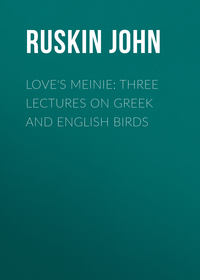
Sesame and Lilies
But farther, you may, perhaps, think it a beneficent ordinance for the generality of men that they do not, with earnestness or anxiety, dwell on such questions of the future because the business of the day could not be done if this kind of thought were taken by all of us for the morrow. Be it so: but at least we might anticipate that the greatest and wisest of us, who were evidently the appointed teachers of the rest, would set themselves apart to seek out whatever could be surely known of the future destinies of their race; and to teach this in no rhetorical or ambiguous manner, but in the plainest and most severely earnest words.
Now, the highest representatives of men who have thus endeavoured, during the Christian era, to search out these deep things, and relate them, are Dante and Milton. There are none who for earnestness of thought, for mastery of word, can be classed with these. I am not at present, mind you, speaking of persons set apart in any priestly or pastoral office, to deliver creeds to us, or doctrines; but of men who try to discover and set forth, as far as by human intellect is possible, the facts of the other world. Divines may perhaps teach us how to arrive there, but only these two poets have in any powerful manner striven to discover, or in any definite words professed to tell, what we shall see and become there; or how those upper and nether worlds are, and have been, inhabited.
And what have they told us? Milton's account of the most important event in his whole system of the universe, the fall of the angels, is evidently unbelievable to himself; and the more so, that it is wholly founded on, and in a great part spoiled and degraded from, Hesiod's account of the decisive war of the younger gods with the Titans. The rest of his poem is a picturesque drama, in which every artifice of invention is visibly and consciously employed; not a single fact being, for an instant, conceived as tenable by any living faith. Dante's conception is far more intense, and, by himself, for the time, not to be escaped from; it is indeed a vision, but a vision only, and that one of the wildest that ever entranced a soul—a dream in which every grotesque type or phantasy of heathen tradition is renewed, and adorned; and the destinies of the Christian Church, under their most sacred symbols, become literally subordinate to the praise, and are only to be understood by the aid, of one dear Florentine maiden.
I tell you truly that, as I strive more with this strange lethargy and trance in myself, and awake to the meaning and power of life, it seems daily more amazing to me that men such as these should dare to play with the most precious truths, (or the most deadly untruths,) by which the whole human race listening to them could be informed, or deceived;—all the world their audiences for ever, with pleased ear, and passionate heart;—and yet, to this submissive infinitude of souls, and evermore succeeding and succeeding multitude, hungry for bread of life, they do but play upon sweetly modulated pipes; with pompous nomenclature adorn the councils of hell; touch a troubadour's guitar to the courses of the suns; and fill the openings of eternity, before which prophets have veiled their faces, and which angels desire to look into, with idle puppets of their scholastic imagination, and melancholy lights of frantic faith in their lost mortal love.
Is not this a mystery of life?
But more. We have to remember that these two great teachers were both of them warped in their temper, and thwarted in their search for truth. They were men of intellectual war, unable, through darkness of controversy, or stress of personal grief, to discern where their own ambition modified their utterances of the moral law; or their own agony mingled with their anger at its violation. But greater men than these have been—innocent-hearted—too great for contest. Men, like Homer and Shakespeare, of so unrecognised personality, that it disappears in future ages, and becomes ghostly, like the tradition of a lost heathen god. Men, therefore, to whose unoffended, uncondemning sight, the whole of human nature reveals itself in a pathetic weakness, with which they will not strive; or in mournful and transitory strength, which they dare not praise. And all Pagan and Christian Civilization thus becomes subject to them. It does not matter how little, or how much, any of us have read, either of Homer or Shakespeare; everything round us, in substance, or in thought, has been moulded by them. All Greek gentlemen were educated under Homer. All Roman gentlemen, by Greek literature. All Italian, and French, and English gentlemen, by Roman literature, and by its principles. Of the scope of Shakespeare, I will say only, that the intellectual measure of every man since born, in the domains of creative thought, may be assigned to him, according to the degree in which he has been taught by Shakespeare. Well, what do these two men, centres of mortal intelligence, deliver to us of conviction respecting what it most behoves that intelligence to grasp? What is their hope—their crown of rejoicing? what manner of exhortation have they for us, or of rebuke? what lies next their own hearts, and dictates their undying words? Have they any peace to promise to our unrest—any redemption to our misery?
Take Homer first, and think if there is any sadder image of human fate than the great Homeric story. The main features in the character of Achilles are its intense desire of justice, and its tenderness of affection. And in that bitter song of the Iliad, this man, though aided continually by the wisest of the gods, and burning with the desire of justice in his heart, becomes yet, through ill- governed passion, the most unjust of men: and, full of the deepest tenderness in his heart, becomes yet, through ill-governed passion, the most cruel of men. Intense alike in love and in friendship, he loses, first his mistress, and then his friend; for the sake of the one, he surrenders to death the armies of his own land; for the sake of the other, he surrenders all. Will a man lay down his life for his friend? Yea—even for his DEAD friend, this Achilles, though goddess-born, and goddess-taught, gives up his kingdom, his country, and his life—casts alike the innocent and guilty, with himself, into one gulf of slaughter, and dies at last by the hand of the basest of his adversaries.
Is not this a mystery of life?
But what, then, is the message to us of our own poet, and searcher of hearts, after fifteen hundred years of Christian faith have been numbered over the graves of men? Are his words more cheerful than the Heathen's—is his hope more near—his trust more sure—his reading of fate more happy? Ah, no! He differs from the Heathen poet chiefly in this—that he recognizes, for deliverance, no gods nigh at hand; and that, by petty chance—by momentary folly—by broken message—by fool's tyranny—or traitor's snare, the strongest and most righteous are brought to their ruin, and perish without word of hope. He indeed, as part of his rendering of character, ascribes the power and modesty of habitual devotion to the gentle and the just. The death-bed of Katharine is bright with visions of angels; and the great soldier-king, standing by his few dead, acknowledges the presence of the Hand that can save alike by many or by few. But observe that from those who with deepest spirit, meditate, and with deepest passion, mourn, there are no such words as these; nor in their hearts are any such consolations. Instead of the perpetual sense of the helpful presence of the Deity, which, through all heathen tradition, is the source of heroic strength, in battle, in exile, and in the valley of the shadow of death, we find only in the great Christian poet, the consciousness of a moral law, through which "the gods are just, and of our pleasant vices make instruments to scourge us;" and of the resolved arbitration of the destinies, that conclude into precision of doom what we feebly and blindly began; and force us, when our indiscretion serves us, and our deepest plots do pall, to the confession, that "there's a divinity that shapes our ends, rough hew them how we will."
Is not this a mystery of life?
Be it so, then. About this human life that is to be, or that is, the wise religious men tell us nothing that we can trust; and the wise contemplative men, nothing that can give us peace. But there is yet a third class, to whom we may turn—the wise practical men. We have sat at the feet of the poets who sang of heaven, and they have told us their dreams. We have listened to the poets who sang of earth, and they have chanted to us dirges and words of despair. But there is one class of men more:– men, not capable of vision, nor sensitive to sorrow, but firm of purpose—practised in business; learned in all that can be, (by handling,) known. Men, whose hearts and hopes are wholly in this present world, from whom, therefore, we may surely learn, at least, how, at present, conveniently to live in it. What will THEY say to us, or show us by example? These kings— these councillors—these statesmen and builders of kingdoms—these capitalists and men of business, who weigh the earth, and the dust of it, in a balance. They know the world, surely; and what is the mystery of life to us, is none to them. They can surely show us how to live, while we live, and to gather out of the present world what is best.
I think I can best tell you their answer, by telling you a dream I had once. For though I am no poet, I have dreams sometimes:– I dreamed I was at a child's Mayday party, in which every means of entertainment had been provided for them, by a wise and kind host. It was in a stately house, with beautiful gardens attached to it; and the children had been set free in the rooms and gardens, with no care whatever but how to pass their afternoon rejoicingly. They did not, indeed, know much about what was to happen next day; and some of them, I thought, were a little frightened, because there was a chance of their being sent to a new school where there were examinations; but they kept the thoughts of that out of their heads as well as they could, and resolved to enjoy themselves. The house, I said, was in a beautiful garden, and in the garden were all kinds of flowers; sweet, grassy banks for rest; and smooth lawns for play; and pleasant streams and woods; and rocky places for climbing. And the children were happy for a little while, but presently they separated themselves into parties; and then each party declared it would have a piece of the garden for its own, and that none of the others should have anything to do with that piece. Next, they quarrelled violently which pieces they would have; and at last the boys took up the thing, as boys should do, "practically," and fought in the flower-beds till there was hardly a flower left standing; then they trampled down each other's bits of the garden out of spite; and the girls cried till they could cry no more; and so they all lay down at last breathless in the ruin, and waited for the time when they were to be taken home in the evening.26
Meanwhile, the children in the house had been making themselves happy also in their manner. For them, there had been provided every kind of indoor pleasure: there was music for them to dance to; and the library was open, with all manner of amusing books; and there was a museum full of the most curious shells, and animals, and birds; and there was a workshop, with lathes and carpenter's tools, for the ingenious boys; and there were pretty fantastic dresses, for the girls to dress in; and there were microscopes, and kaleidoscopes; and whatever toys a child could fancy; and a table, in the dining-room, loaded with everything nice to eat.
But, in the midst of all this, it struck two or three of the more "practical" children, that they would like some of the brass-headed nails that studded the chairs; and so they set to work to pull them out. Presently, the others, who were reading, or looking at shells, took a fancy to do the like; and, in a little while, all the children, nearly, were spraining their fingers, in pulling out brass-headed nails. With all that they could pull out, they were not satisfied; and then, everybody wanted some of somebody else's. And at last, the really practical and sensible ones declared, that nothing was of any real consequence, that afternoon, except to get plenty of brass-headed nails; and that the books, and the cakes, and the microscopes were of no use at all in themselves, but only, if they could be exchanged for nail-heads. And at last they began to fight for nail-heads, as the others fought for the bits of garden. Only here and there, a despised one shrank away into a corner, and tried to get a little quiet with a book, in the midst of the noise; but all the practical ones thought of nothing else but counting nail-heads all the afternoon—even though they knew they would not be allowed to carry so much as one brass knob away with them. But no—it was—"Who has most nails? I have a hundred, and you have fifty; or, I have a thousand, and you have two. I must have as many as you before I leave the house, or I cannot possibly go home in peace." At last, they made so much noise that I awoke, and thought to myself, "What a false dream that is, of CHILDREN!" The child is the father of the man; and wiser. Children never do such foolish things. Only men do.
But there is yet one last class of persons to be interrogated. The wise religious men we have asked in vain; the wise contemplative men, in vain; the wise worldly men, in vain. But there is another group yet. In the midst of this vanity of empty religion—of tragic contemplation—of wrathful and wretched ambition, and dispute for dust, there is yet one great group of persons, by whom all these disputers live—the persons who have determined, or have had it by a beneficent Providence determined for them, that they will do something useful; that whatever may be prepared for them hereafter, or happen to them here, they will, at least, deserve the food that God gives them by winning it honourably: and that, however fallen from the purity, or far from the peace, of Eden, they will carry out the duty of human dominion, though they have lost its felicity; and dress and keep the wilderness, though they no more can dress or keep the garden.
These,—hewers of wood, and drawers of water,—these, bent under burdens, or torn of scourges—these, that dig and weave—that plant and build; workers in wood, and in marble, and in iron—by whom all food, clothing, habitation, furniture, and means of delight are produced, for themselves, and for all men beside; men, whose deeds are good, though their words may be few; men, whose lives are serviceable, be they never so short, and worthy of honour, be they never so humble;—from these, surely, at least, we may receive some clear message of teaching; and pierce, for an instant, into the mystery of life, and of its arts.
Yes; from these, at last, we do receive a lesson. But I grieve to say, or rather—for that is the deeper truth of the matter—I rejoice to say—this message of theirs can only be received by joining them—not by thinking about them.
You sent for me to talk to you of art; and I have obeyed you in coming. But the main thing I have to tell you is,—that art must not be talked about. The fact that there is talk about it at all, signifies that it is ill done, or cannot be done. No true painter ever speaks, or ever has spoken, much of his art. The greatest speak nothing. Even Reynolds is no exception, for he wrote of all that he could not himself do, and was utterly silent respecting all that he himself did.
The moment a man can really do his work he becomes speechless about it. All words become idle to him—all theories.
Does a bird need to theorize about building its nest, or boast of it when built? All good work is essentially done that way—without hesitation, without difficulty, without boasting; and in the doers of the best, there is an inner and involuntary power which approximates literally to the instinct of an animal—nay, I am certain that in the most perfect human artists, reason does NOT supersede instinct, but is added to an instinct as much more divine than that of the lower animals as the human body is more beautiful than theirs; that a great singer sings not with less instinct than the nightingale, but with more—only more various, applicable, and governable; that a great architect does not build with less instinct than the beaver or the bee, but with more—with an innate cunning of proportion that embraces all beauty, and a divine ingenuity of skill that improvises all construction. But be that as it may—be the instinct less or more than that of inferior animals—like or unlike theirs, still the human art is dependent on that first, and then upon an amount of practice, of science,—and of imagination disciplined by thought, which the true possessor of it knows to be incommunicable, and the true critic of it, inexplicable, except through long process of laborious' years. That journey of life's conquest, in which hills over hills, and Alps on Alps arose, and sank,—do you think you can make another trace it painlessly, by talking? Why, you cannot even carry us up an Alp, by talking. You can guide us up it, step by step, no otherwise—even so, best silently. You girls, who have been among the hills, know how the bad guide chatters and gesticulates, and it is "Put your foot here;" and "Mind how you balance yourself there;" but the good guide walks on quietly, without a word, only with his eyes on you when need is, and his arm like an iron bar, if need be.
In that slow way, also, art can be taught—if you have faith in your guide, and will let his arm be to you as an iron bar when need is. But in what teacher of art have you such faith? Certainly not in me; for, as I told you at first, I know well enough it is only because you think I can talk, not because you think I know my business, that you let me speak to you at all. If I were to tell you anything that seemed to you strange you would not believe it, and yet it would only be in telling you strange things that I could be of use to you. I could be of great use to you—infinite use— with brief saying, if you would believe it; but you would not, just because the thing that would be of real use would displease you. You are all wild, for instance, with admiration of Gustave Dore. Well, suppose I were to tell you, in the strongest terms I could use, that Gustave Dore's art was bad—bad, not in weakness,—not in failure,—but bad with dreadful power—the power of the Furies and the Harpies mingled, enraging, and polluting; that so long as you looked at it, no perception of pure or beautiful art was possible for you. Suppose I were to tell you that! What would be the use? Would you look at Gustave Dore less? Rather, more, I fancy. On the other hand, I could soon put you into good humour with me, if I chose. I know well enough what you like, and how to praise it to your better liking. I could talk to you about moonlight, and twilight, and spring flowers, and autumn leaves, and the Madonnas of Raphael—how motherly! and the Sibyls of Michael Angelo—how majestic! and the Saints of Angelico—how pious! and the Cherubs of Correggio—how delicious! Old as I am, I could play you a tune on the harp yet, that you would dance to. But neither you nor I should be a bit the better or wiser; or, if we were, our increased wisdom could be of no practical effect. For, indeed, the arts, as regards teachableness, differ from the sciences also in this, that their power is founded not merely on facts which can be communicated, but on dispositions which require to be created. Art is neither to be achieved by effort of thinking, nor explained by accuracy of speaking. It is the instinctive and necessary result of power, which can only be developed through the mind of successive generations, and which finally burst into life under social conditions as slow of growth as the faculties they regulate. Whole aeras of mighty history are summed, and the passions of dead myriads are concentrated, in the existence of a noble art, and if that noble art were among us, we should feel it and rejoice; not caring in the least to hear lectures on it; and since it is not among us, be assured we have to go back to the root of it, or, at least, to the place where the stock of it is yet alive, and the branches began to die.
And now, may I have your pardon for pointing out, partly with reference to matters which are at this time of greater moment than the arts—that if we undertook such recession to the vital germ of national arts that have decayed, we should find a more singular arrest of their power in Ireland than in any other European country? For in the eighth century Ireland possessed a school of art in her manuscripts and sculpture, which, in many of its qualities— apparently in all essential qualities of decorative invention—was quite without rival; seeming as if it might have advanced to the highest triumphs in architecture and in painting. But there was one fatal flaw in its nature, by which it was stayed, and stayed with a conspicuousness of pause to which there is no parallel: so that, long ago, in tracing the progress of European schools from infancy to strength, I chose for the students of Kensington, in a lecture since published, two characteristic examples of early art, of equal skill; but in the one case, skill which was progressive—in the other, skill which was at pause. In the one case, it was work receptive of correction—hungry for correction; and in the other, work which inherently rejected correction. I chose for them a corrigible Eve, and an incorrigible Angel, and I grieve to say that the incorrigible Angel was also an Irish Angel!27
And the fatal difference lay wholly in this. In both pieces of art there was an equal falling short of the needs of fact; but the Lombardic Eve knew she was in the wrong, and the Irish Angel thought himself all right. The eager Lombardic sculptor, though firmly insisting on his childish idea, yet showed in the irregular broken touches of the features, and the imperfect struggle for softer lines in the form, a perception of beauty and law that he could not render; there was the strain of effort, under conscious imperfection, in every line. But the Irish missal-painter had drawn his angel with no sense of failure, in happy complacency, and put red dots into the palm of each hand, and rounded the eyes into perfect circles, and, I regret to say, left the mouth out altogether, with perfect satisfaction to himself.
May I without offence ask you to consider whether this mode of arrest in ancient Irish art may not be indicative of points of character which even yet, in some measure, arrest your national power? I have seen much of Irish character, and have watched it closely, for I have also much loved it. And I think the form of failure to which it is most liable is this,—that being generous- hearted, and wholly intending always to do right, it does not attend to the external laws of right, but thinks it must necessarily do right because it means to do so, and therefore does wrong without finding it out; and then, when the consequences of its wrong come upon it, or upon others connected with it, it cannot conceive that the wrong is in anywise of its causing or of its doing, but flies into wrath, and a strange agony of desire for justice, as feeling itself wholly innocent, which leads it farther astray, until there is nothing that it is not capable of doing with a good conscience.
But mind, I do not mean to say that, in past or present relations between Ireland and England, you have been wrong, and we right. Far from that, I believe that in all great questions of principle, and in all details of administration of law, you have been usually right, and we wrong; sometimes in misunderstanding you, sometimes in resolute iniquity to you. Nevertheless, in all disputes between states, though the stronger is nearly always mainly in the wrong, the weaker is often so in a minor degree; and I think we sometimes admit the possibility of our being in error, and you never do.
And now, returning to the broader question, what these arts and labours of life have to teach us of its mystery, this is the first of their lessons—that the more beautiful the art, the more it is essentially the work of people who FEEL THEMSELVES WRONG;—who are striving for the fulfilment of a law, and the grasp of a loveliness, which they have not yet attained, which they feel even farther and farther from attaining the more they strive for it. And yet, in still deeper sense, it is the work of people who know also that they are right. The very sense of inevitable error from their purpose marks the perfectness of that purpose, and the continued sense of failure arises from the continued opening of the eyes more clearly to all the sacredest laws of truth.









